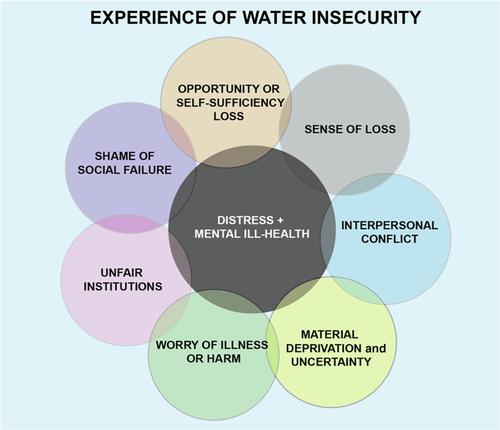当前位置:
X-MOL 学术
›
WIREs Water
›
论文详情
Our official English website, www.x-mol.net, welcomes your feedback! (Note: you will need to create a separate account there.)
Water and mental health
WIREs Water ( IF 8.2 ) Pub Date : 2020-07-07 , DOI: 10.1002/wat2.1461 Amber Wutich 1 , Alexandra Brewis 1 , Alexander Tsai 2
WIREs Water ( IF 8.2 ) Pub Date : 2020-07-07 , DOI: 10.1002/wat2.1461 Amber Wutich 1 , Alexandra Brewis 1 , Alexander Tsai 2
Affiliation

|
There is a well‐established connection among water quality, sanitation, and physical health. The potentially important relationship between water and mental health is considerably less studied. Reviewing evidence from ethnography, geography, folklore, indigenous studies, rural medicine, drought research, and large‐n statistical studies, we argue there is now good theoretical rationale and growing evidence of water insecurity as a possible driver of mental ill‐health. Furthermore, some nascent evidence suggests that emotionally meaningful interactions with water might improve mental health outcomes. Leveraging these literatures, we address the many ways in which mental health outcomes are conceptualized and operationalized in water research, including as emotional distress, perceived stress, depressive symptoms, anxiety symptoms, somatic symptoms, and quality of life. We outline arguments supporting seven possible (and likely interlocking) mechanisms that could explain such a relationship: (a) material deprivation and related uncertainty, (b) shame of social failure, (c) worry about health threats, (d) loss of connections to people and places, (e) frustration around opportunity losses and restricted autonomy, (f) interpersonal conflict and intimate partner violence, and (g) institutional injustice or unfairness. However, we explain that as most existing studies are ethnographic, qualitative, or cross‐sectional, a causal relationship between water and mental ill‐health is yet to be confirmed empirically. More research on this topic is needed, particularly given that poorly understood connections may create barriers to achieving Sustainable Development Goals 3 (health) and 6 (water). We further suggest that tracking mental health indicators may provide unique and as‐yet underappreciated insights into the efficacy of water projects and other development interventions.
中文翻译:

水与精神健康
水质,环境卫生和身体健康之间建立了良好的联系。关于水与心理健康之间潜在的重要关系的研究很少。回顾民族志,地理,民俗学,本土研究,农村医学,干旱研究和大型n统计研究的证据,我们认为现在有很好的理论基础,越来越多的证据表明水不安全可能是精神疾病的驱动因素。此外,一些新生证据表明,与水进行情感上有意义的互动可能会改善心理健康状况。利用这些文献,我们研究了在水研究中将心理健康结局概念化和可操作化的多种方式,包括情绪困扰,感知压力,抑郁症状,焦虑症状,躯体症状,和生活质量。我们概述了支持七种可能(并且可能是相互联系)的机制的论点,这些机制可以解释这种关系:(a)物质匮乏和相关的不确定性,(b)社会失败的耻辱,(c)对健康威胁的担忧,(d)失去联系(e)机会丧失和自主权受到挫折,(f)人际冲突和亲密伴侣暴力,以及(g)体制不公或不公平。但是,我们解释说,由于大多数现有研究是人种学,定性研究或横断面研究,因此水与精神疾病之间的因果关系尚待经验证实。需要对此主题进行更多的研究,特别是鉴于人们对联系的了解不足,可能会阻碍实现可持续发展目标3(健康)和6(水)。
更新日期:2020-07-07
中文翻译:

水与精神健康
水质,环境卫生和身体健康之间建立了良好的联系。关于水与心理健康之间潜在的重要关系的研究很少。回顾民族志,地理,民俗学,本土研究,农村医学,干旱研究和大型n统计研究的证据,我们认为现在有很好的理论基础,越来越多的证据表明水不安全可能是精神疾病的驱动因素。此外,一些新生证据表明,与水进行情感上有意义的互动可能会改善心理健康状况。利用这些文献,我们研究了在水研究中将心理健康结局概念化和可操作化的多种方式,包括情绪困扰,感知压力,抑郁症状,焦虑症状,躯体症状,和生活质量。我们概述了支持七种可能(并且可能是相互联系)的机制的论点,这些机制可以解释这种关系:(a)物质匮乏和相关的不确定性,(b)社会失败的耻辱,(c)对健康威胁的担忧,(d)失去联系(e)机会丧失和自主权受到挫折,(f)人际冲突和亲密伴侣暴力,以及(g)体制不公或不公平。但是,我们解释说,由于大多数现有研究是人种学,定性研究或横断面研究,因此水与精神疾病之间的因果关系尚待经验证实。需要对此主题进行更多的研究,特别是鉴于人们对联系的了解不足,可能会阻碍实现可持续发展目标3(健康)和6(水)。


























 京公网安备 11010802027423号
京公网安备 11010802027423号